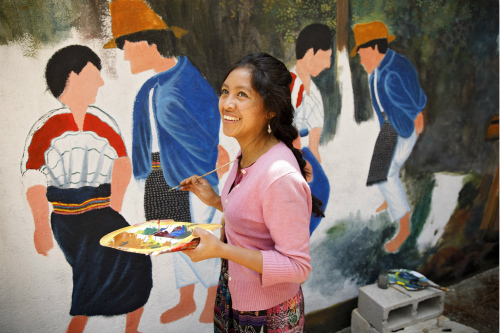
Message from Ms. Audrey Azoulay, Director-General of UNESCO, on the Occasion of the International Day of the World’s Indigenous Peoples文章源自英文巴士-https://www.en84.com/7380.html
教科文组织总干事奥德蕾·阿祖莱世界土著人民国际日致辞文章源自英文巴士-https://www.en84.com/7380.html
文章源自英文巴士-https://www.en84.com/7380.html
9 August 2019文章源自英文巴士-https://www.en84.com/7380.html
2019年8月9日文章源自英文巴士-https://www.en84.com/7380.html
文章源自英文巴士-https://www.en84.com/7380.html
Since 1982, the International Day of the World’s Indigenous Peoples has provided us with a unique opportunity to raise global awareness of the contributions made by indigenous peoples towards building peace and developing sustainable and resilient societies.文章源自英文巴士-https://www.en84.com/7380.html
文章源自英文巴士-https://www.en84.com/7380.html
自1982年以来,世界土著人民国际日一直是提高全球意识的良机,让我们能够更好地认识到土著人民对建设和平、发展可持续和有韧性的社会作出的重要贡献。文章源自英文巴士-https://www.en84.com/7380.html
文章源自英文巴士-https://www.en84.com/7380.html
On this Day, we take steps to recognise and acknowledge indigenous peoples as knowledge-holders who have contributed to the conservation and sustainable use of the world’s biodiversity and ecosystems. This was recently highlighted in the landmark Global Assessment Report on Biodiversity, produced by the Intergovernmental Science-Policy Platform on Biodiversity and Ecosystem Services (IPBES) and launched at UNESCO Headquarters in May of this year.
值此国际日,让我们行动起来,承认并重视作为知识守护者的土著人民对世界生物多样性和生态系统的保护与可持续利用所作的重要贡献。今年5月,生物多样性和生态系统服务政府间科学政策平台在教科文组织总部发布的首份生物多样性全球评估报告也强调了这一点。
Indigenous persons account for 5% of the world’s population, but make up 15% of the world’s poorest. Worldwide, they face a number of considerable challenges, including growing migration, educational disadvantage, pressure to culturally assimilate, enforced relocation, gender-based violence and other forms of discrimination, poverty, as well as limited access to health services, employment, information services and broadband connectivity.
土著人民占全球人口的5%,但却占全球最贫困人口的15%。世界各地的土著人民都面临着诸多挑战,包括移徙加剧、教育劣势、文化同化压力、被迫迁移、性别暴力和其他形式的歧视、贫困等等,他们能获取的医疗服务、就业机会、信息技术和宽带连接服务也十分有限。
The United Nations and UNESCO are committed to protecting the rights of indigenous peoples, and to enabling them to participate fully and equally at national and international levels. In line with Agenda 2030, which recognises indigenous peoples as a distinct group and acknowledges the role it must play in global efforts to build a better future for all, the 2018 UNESCO policy on Engaging with Indigenous Peoples guides the Organization’s work and ensures that its policies, planning, programming and implementation uphold the United Nations Declaration on the Rights of Indigenous Peoples.
联合国和教科文组织都致力于保护土著人民的权利,让他们能够充分且平等地参与国家与国际事务。《2030年议程》承认土著人民是一个独特的群体,并承认土著人民必将在为所有人建设更美好未来的全球努力中起到重要作用。有鉴于此,本组织以2018年教科文组织关于与土著人民交往的政策为指导方针开展相关工作,并确保其政策、规划、计划与实施都符合《联合国土著人民权利宣言》。
Indigenous cultures possess a wealth of knowledge crucial for the achievement of the Sustainable Development Goals, and particularly for the preservation of the environment and the world’s biodiversity. UNESCO has been working to preserve the intangible heritage of traditional skills and know-how, as well as to raise awareness of their importance, through programmes such as Local and Indigenous Knowledge Systems (LINKS) which supports governments to create crucial interfaces between scientific and indigenous communities. This has been furthered through a policy brief on “Indigenous and Local Knowledge(s) and Science(s) for Sustainable Development” issued by The Scientific Advisory Board (SAB) of the United Nations Secretary-General. Furthermore, central to UNESCO’s Man and the Biosphere Programme is the involvement of local and indigenous communities in the management of Biospheres, as well as the collaborative efforts to find solutions to conservation and environmental issues.
土著文化是实现可持续发展目标的宝贵知识财富,特别是在保护环境和世界生物多样性方面。教科文组织一直努力保护传统知识和技艺这一非物质遗产,增强人们对其重要性的认识。例如,地方和土著知识系统计划支持政府在科学界与土著社区之间实现对接。联合国秘书长科学咨询委员会发布“土著和地方知识与科学促进可持续发展”政策简报,进一步推动了这项工作。此外,教科文组织“人与生物圈计划”的核心也在于让地方和土著社区参与生物圈管理,为寻找保护与环境问题的解决方案而共同努力。
The disappearance of indigenous languages is a major threat to indigenous communities and their unique heritage, as well as to our global diversity and our very potential for creativity and innovation. Through the International Year of Indigenous Languages (IYIL2019), UNESCO strives to focus attention on these critical issues, and to take steps towards global collective action to address them.
土著语言的消失是对土著社区及其独特遗产以及全球多样性和创意创新潜力的重大威胁。教科文组织力求通过“土著语言国际年”聚焦这些重要问题,并推动采取全球集体行动加以应对。
UNESCO, as an institution in a unique multilateral and international position, is mobilising a large network of individual and institutional partners such as the Latin American and the Caribbean countries for the Online Indigenous Film Festival that took place in June, to take urgent measures to support, promote and provide access to indigenous languages, as well as to share good practices.
教科文组织作为具有多边国际组织独特地位的机构,积极发挥广泛的个人与机构合作伙伴网络的作用,例如于今年6月与拉丁美洲及加勒比国家共同举办了“在线土著电影节”,旨在采取紧急措施,支持、宣传并推介土著语言,分享良好实践。
In March of this year, UNESCO worked to raise awareness of newly established indigenous community media and radio networks worldwide, and for the development of applications for indigenous languages, during a hackathon to develop innovative language technology solutions in the Asia-Pacific region.
今年3月,教科文组织针对新建的全球土著社区媒体和广播网络开展了宣传活动。为支持开发土著语言应用,教科文组织还在亚太地区举办了一次开发创新语言技术解决方案的编程马拉松比赛。
Finally, we are very excited to announce that thanks to a vast collaboration, the next edition of the El Cuento de las 1000 Palabras, a Peruvian competition on story-telling, will not only be held in Spanish, but will also be opened to the 48 indigenous languages of the country.
最后,我们十分高兴地宣布,得益于各方的广泛合作,下一届秘鲁“千字故事”叙事大赛将不仅限于西班牙语,还可使用该国的48种土著语言。
At UNESCO and the United Nations, we are convinced, now more than ever, that the achievement of the Sustainable Development Goals requires that no one is left behind. Indigenous peoples, their languages, values, knowledge systems and “knowhow” must all play a role in the global endeavour to find just and sustainable paths forward for the living world and for humanity as a whole.
教科文组织和联合国比以往任何时候都更加坚信,要实现可持续发展目标,就不能让任何人掉队。土著人民与他们的语言、价值、知识系统和技能都必须成为全球努力的一部分,为全世界和全人类找到一条公正、可持续的前进之路。

